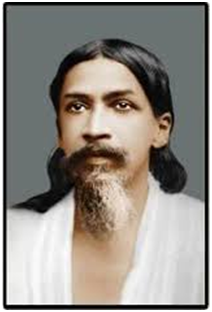
Sri Aurobindo Ghose (1872–1950) — a towering figure in India’s intellectual, spiritual, and nationalist renaissance — stands as one of the most profound visionaries of modern India. The college’s very foundation is a tribute to his enduring vision: one that saw education as a means to evolve the individual and uplift society. Its guiding motto, “Tamaso Ma Jyotirgamaya” — “Lead me from darkness to light” — encapsulates the spirit of Sri Aurobindo’s philosophy and forms the bedrock of the college’s mission.
Sri Aurobindo was not only a revolutionary thinker and freedom fighter, but also a philosopher, poet, yogi, and educator. Educated at St. Paul’s School, London, and King’s College, Cambridge, he mastered classical European and Indian languages, and returned to India in 1893 to serve as Vice-Principal at Baroda College. During this time, he delved deep into Indian scriptures, political theory, and cultural identity, laying the foundation for his multifaceted intellectual and spiritual work.

His later years in Pondicherry were dedicated to developing his vision of Integral Yoga — a transformative path that harmonizes the physical, mental, and spiritual dimensions of being. In writings such as The Life Divine, Savitri, Essays on the Gita, and The Synthesis of Yoga, he redefined the relationship between self-realization and collective progress, urging humanity toward a higher consciousness.
Central to Sri Aurobindo’s educational philosophy was the belief that true learning is a process of self-unfolding.
“The first principle of true teaching is that nothing can be taught.” The educator, in his view, is a guide who awakens the latent powers within the student — nurturing not just knowledge, but clarity, courage, and inner light.
Today, Sri Aurobindo College remains committed to translating this philosophy into practice. While grounded in academic rigor, it strives to provide an environment where students are encouraged to explore, question, and grow — intellectually, morally, and spiritually. In this way, the college not only honours the name it bears, but also embodies a living legacy of thought, truth, and transformation.